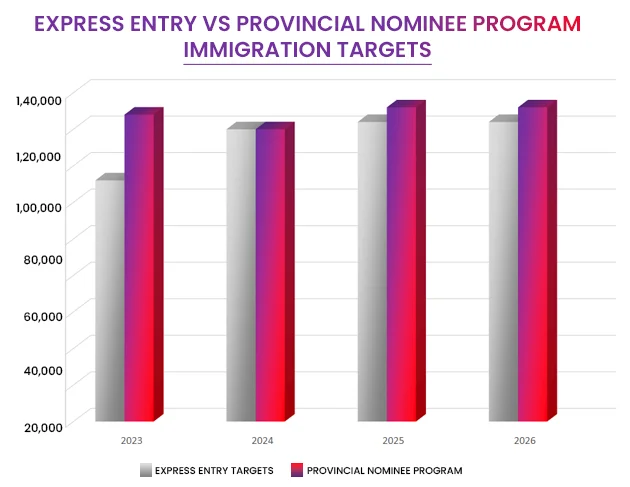Express Entry vs PNP: A Comprehensive Guide to Canadian Immigration in 2024

Last Updated On : February 10 , 2024
2024 offers a bright future for talented people hoping to establish themselves in Canada. The Provincial Nominee Program (PNP) and Express Entry (EE) are well-known routes. With different benefits and things to consider, each provides a different path to permanent residency. Selecting the appropriate one may seem like a maze, but fear not! With the most recent knowledge and ideas, this thorough guide will enable you to make the most of your travels.
Knowing the differences between EE and PNP is essential, regardless of your dreams of living in a booming metropolis or a quaint provincial town. We'll review important distinctions, including recent program revisions, eligibility requirements, prices, and processing timelines. With the help of this comparative study, you will be able to weigh the advantages and disadvantages of each pathway and make an informed choice.
Achieving the Canadian dream requires selecting the appropriate immigration route. In 2024, the Provincial Nominee Program (PNP) and Express Entry are two popular choices for skilled immigrants. In this standing, we will contrast these programs, point out recent adjustments, and offer advice on how to make an informed choice.
Express Entry:
A quick and easy method to apply for permanent residency in Canada is through express entry. You can view your score and how you stack up against other applicants in the pool, making it an open system. Even with a high score, there is no assurance that you will be invited to apply for permanent residence. The minimum CRS score needed to be invited to apply may differ based on several variables, including the volume of candidates in the pool and the demands of Canada's labour market. You must fulfil the minimal requirements for one of the following programs to be eligible for Express Entry:
- Federal Skilled Worker (FSW) Program
- Canadian Experience Class (CEC) Program
- Federal Skilled Trades Program (FSTP) Program
PNP Non-Express Entry Program:
The Provincial Nominee Program Non-Express Entry pathway provides an alternative option to enter Canada without having to go through the competitive Express Entry pool. This pathway allows you to apply directly to a specific province based on their unique needs and selection criteria. It is a good option to consider as it may increase your chances of success. However, keep in mind that it is not a one-size-fits-all solution.
Each province has its own requirements, and streams that are designed for skilled trades, entrepreneurship, family ties, and more. Therefore, it is important to carefully research and find the programs that align with your skills, experience, and future aspirations. To apply, you need to tailor your profile to the chosen program's criteria. If you are successful, you will receive a provincial nomination which can boost your permanent residency application by adding 600 points or granting direct residency, depending on the program.

Express Entry Targets for 2024:
The Canadian government has set ambitious immigration targets 2024, aiming to welcome a substantial number of skilled immigrants through Express Entry. The specific target for the year can be obtained from the official immigration website or a licensed RCIC.
Provincial Nominee Targets for 2024:
Targets for Canada's Provincial Nominee Program (PNP) will increase from 105,500 in 2023 to 110,000 in 2024. This reflects Canada's commitment to address regional labor market needs and support economic growth while highlighting the importance of provincial nomination as a strategic immigration tool.
Comparison of Express Entry and Provincial Nominee Program (PNP) in Canada
| Metrics | Express Entry | Provincial Nominee Program (PNP) |
|---|---|---|
| Application Process and Processing Time | A federal point-based system with approximately six months of processing time. | A regional nomination program with processing times varying by province, typically longer than Express Entry. |
| Immigration Fee | Includes an application fee and a Right of Permanent Residence Fee (RPRF). | PNP: Fees vary by province and program. |
| Immigration Targets | Targets set by the federal government. | Targets set by individual provinces. |
| Benefits | National eligibility pool, quick processing. | Province-specific benefits, the potential for lower Comprehensive Ranking System (CRS) scores. |
| Profile Evaluation | Uses the Comprehensive Ranking System (CRS) based on factors like education, work experience, and language proficiency. | Involves a Provincial Nominee Certificate, with criteria set by provinces, including job offers, adaptability, and connections to the region. |
| Recent Changes and Updates | Set ambitious immigration targets in 2024; category-based draws will continue. | Recent updates in specific provinces, such as changes in eligibility criteria, occupation in-demand lists, and processing times. |
| Scoring System | Points-based system, minimum 67 points required | No single scoring system, eligibility based on program-specific criteria. |
These variations draw attention to the unique characteristics of each immigration route, highlighting elements like eligibility requirements, expenses, processing periods, and perks. To make an informed decision based on their own circumstances and interests, people considering immigrating to Canada should carefully evaluate these factors.Seeking advice from a licensed immigration counsellor (RCIC) can offer customised direction based on unique circumstances.
Profile Evaluations: Express Entry Vs PNP:
Express Entry Profile:
A detailed online profile is created in the Express Entry pool, where points are assigned based on education, work experience, language proficiency, and other factors. Candidates with higher Comprehensive Ranking System (CRS) scores are more likely to receive an Invitation to Apply (ITA).
PNP Profile:
Each province sets its criteria for selecting nominees. This may include factors like a valid job offer, connection to the province, or adaptability. Successful nominees receive a Provincial Nominee Certificate, which boosts their chances in the federal Express Entry system.
Which Option Is More Expensive: Express Entry or PNP?
The cost comparison between Express Entry and PNP depends on individual circumstances, such as family size, application type, and additional fees. Generally, Express Entry applicants may incur costs for the application fee and Right of Permanent Residence Fee (RPRF), while PNP applicants may face fees specific to the chosen province.
Conclusion: Making an Informed Decision for Your Canadian Dream
In summary, there are two practical routes to permanent residence in Canada: Express Entry and PNP. When deciding between the two, consider your preferences, eligibility, and long-term objectives. Seeking advice from a qualified immigration consultant (RCIC) can guarantee compliance with the most recent program standards and offer customised direction.
Make sure you are aware of the most recent modifications, comprehend the special features of every application, and carefully consider your profile before deciding. You can take the best possible immigration route to start living the Canadian dream if you give it some serious thought.
